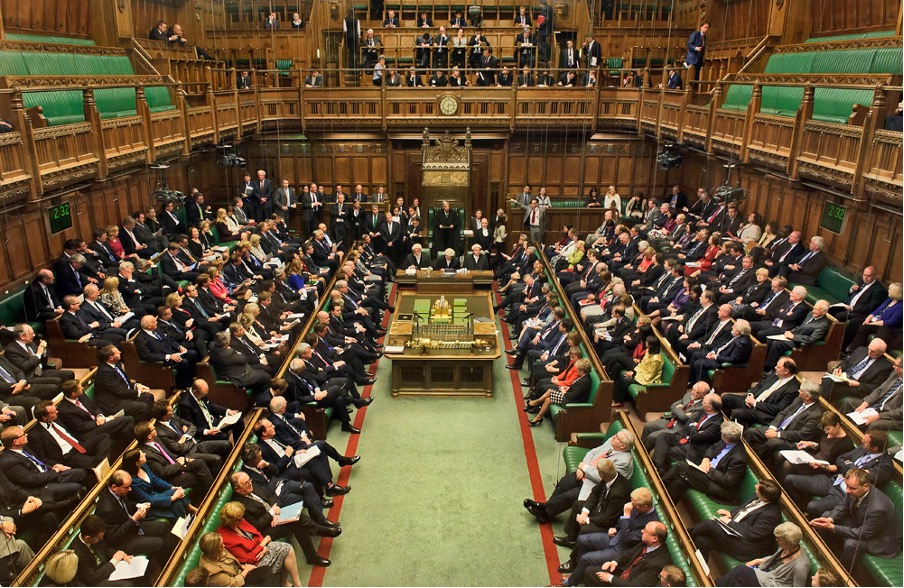
Featured Image: ‘House of Commons: MPs debate 2013 Queen’s Speech‘ by Catherine Bebbington (Parliamentary Copyright) from UK Parliament on Flickr is licensed under CC BY-NC 4.0 (link to license deed). Link to old license.
The University of Exeter’s two main political societies are fascinating groups motivated by a desire to see their parent party gain power. Both the Exeter University Labour Society and Exeter University Conservative Association contain the activism, the camaraderie, and the friendly factionalism that their parliamentary elders espouse, but both pride themselves on their inclusivity and accommodation of a broad church of beliefs.
Exeter University Conservative Association
Conversations with some of Exeter University’s most active young Conservatives has revealed a society with a wide array of views and political motivations. The group has a membership estimated at more than one hundred and twenty, and it is rumoured to be one of the largest student political societies in the country. This raises many questions about what motivates Exeter students to get involved with the Tories — when young people in general overwhelmingly support alternative parties — and what sort of beliefs these students hold.
There are the traditional Conservative ideologues: people who are enamoured by free-market economics, the primacy of individualism, and hold a preference for a modern sense of traditionalism. This is the true core of the party and includes the historical one-nation conservatives, Thatcherites and right-wingers — people who have always found a political home in the Conservative Party. They are joined by libertarians, who have been politically inspired by the Covid-19 pandemic to take up arms against what they see as unnecessary government overreach. These folk have been welcome in the Tory party for a long time but have only really been excited enough to actively partake in recent years.
Beyond the traditional coalition of Conservative Party members are also those motivated by a disdain for ‘wokeism’ and ‘cancel culture’. That disdain is partly rooted in traditionalism, but more evidently from the protection of the principle of free speech — which many young conservatives see as being under threat. There is also the emergence of the ‘Red Tories’, who are socially conservative but economically left members, as well as the single-issue Brexiteers who were directed towards the politics of the populist right by a desire to leave the EU at all costs. Most members overlap in a multitude of these classifications, and, unlike its opposite party, distinct political differences are rarely brought into the open.
Instead EUCA is broadly united by a series of political issues, the most salient of which are primarily economic matters. Substantial healthcare reform is seen as one of the most important issues amongst young Tories, as the NHS has been in persistent crisis for years and continues to take up ever more scarce government resources. Another matter is the post-pandemic tax and spend programme. There is disquiet within the society because of the way the government has approached the need for treasury revenue. There are those that fundamentally oppose all tax rises and see it as a worrying lurch to ‘big government’, and there are those that understand the need for hikes but are critical of the measures being introduced.
These are not the only major issues members are concerned about. Things that are typical concerns for young people are also at the forefront of the minds of young Tories, such as the cost-of-living crisis. The chronic shortage of affordable housing is something that many EUCA members would like to see addressed by the government properly. The society embraces a wide range of views and opinions that roughly fall into the Conservative broad church. Members join for different reasons but are usually spurred by one or multiple aspects of the Tory philosophy and can easily find fellow believers who think the same way.
Exeter University Labour Society
The university has two societies for those on the left. The first is the Socialist Students Society which tackles the more ideological and philosophical questions of the left, and the other is the Exeter University Labour Society which concerns itself more with party affairs. As has always been the case with the Labour Party, the first question asked of members is: what faction do you belong to? The answer to this question is, however, irrelevant as the group embraces everyone regardless of their views on Corbyn or Blair.
There are three primary factions that exist: the left, the soft left, and the moderates. The left includes those that are still fully supportive of Jeremy Corbyn and believe that his vision of the party and the country is the right one to follow. Then there is the soft left, this includes more or less anyone from the centre of the party — including disillusioned Momentum members, the hardcore Milifandom, and those unattracted to factions. Lastly, there exists the moderate wing, which consists of Blairites, Brownites, and anyone nostalgic for New Labour. Unlike their Conservative peers, the Labour Society likes to acknowledge everyone’s factional standing from the outset and proceed with friendly debate thereafter.
Similarly to EUCA, there are fundamental issues that concern the membership of all factional stripes. These include the cost-of-living crisis and especially the housing shortages. This discontent has churned itself into much dislike for NIMBYism and the meaningless objection to housing development on brownfield sites by local residents and councils. Other common ground is the preservation of welfare provisions such as the £20 Universal Credit uplift and the introduction of a more progressive tax code. Nationalisation of certain industries is still a salient issue amongst young Labourites, but this is where the factional differences begin to reveal themselves.
One area where the Labour Society is united is around the issue of the party leadership. There is broad agreement from all sides of the spectrum that Sir Keir Starmer is hopeless and destined to fail. The left believe he is purging them out of the party, the soft left have preferred candidates in the mould of Angela Rayner, Lisa Nandy or Andy Burnham, and the moderates believe he hasn’t gone far enough to differentiate himself from the past decade of leadership. On top of those issues, all are worried about his insufficient charisma and political capabilities. Despite the perception of the party as being constantly riddled with infighting — which is no doubt true — the Exeter University Labour Society embraces it and takes pride in it. For them, it is less like having many parties within a party and more like having many homes within a home.
Exeter University Liberal Democrat Society
Attempts were made to reach out to the Liberal Democrats, but to no avail.


Average Rating